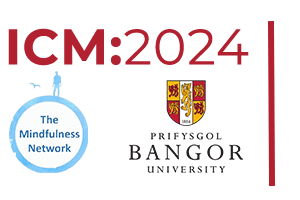Social, cultural, and systemic approaches
How do different perspectives shape mindfulness?
In this strand, we’ll look at mindfulness-based approaches in light of today’s big challenges, like social inequality, racial injustice, and the ecological crisis, and how these affect individuals and groups. We’ll explore the potential for mindfulness to help us navigate these challenges and what mindfulness-based practitioners, teachers, and researchers can do to build awareness and offer mindfulness in ways that are fair and welcoming for everyone.
Strand 3 includes, but is not limited to:
- Mindfulness and neurodiversity
- Mindfulness and culture
- Equality, diversity, and inclusion in mindfulness
- Mindfulness and healthcare
- Mental and physical health
- Mindful parenting
- Systemic barriers to accessing mindfulness
- Mindfulness in education
Strand 3 begins with a Keynote from Rhonda Magee. After this you can choose to attend either: a related panel discussion, workshop, research symposium, or guided practice, which will be held across various spaces in Bangor University’s Pontio Centre
keynote
Deepening the Roots of Socially-Engaged Mindfulness: Awareness-based Support for Change and Transformation in Troubled Times with Rhonda Magee
In a world of difference and diversity, how does mindfulness help cultivate ethical awareness necessary to the maintenance of universal human rights and planetary consciousness? What additional practices might deepen and diversify our own resources for this times? In this Keynote address, Professor Rhonda Magee will argue that mindfulness may be the key to the development of the moral agility and empathic dexterity required for more effectively managing the challenges of our times. Throughout the Western world, major institutions are presently confronted by the reality that post-colonial, profoundly integrated and multicultural communities are rife with causes and conditions leading to heightened fear, threat, and destabilization. At the same time, Professor Magee posits, these conditions create the potential for lived experiences that are not merely informative but may be essential to the expansion of the moral imagination and capacity for everyday compassion and cooperation necessary to more inclusive identities and lived-ethics. She will describe why and how socio-ethical mindfulness is the key to maximizing our capacity to choose actions that connect rather than divide, and to deepening the roots of wellbeing for us all in theses times.panel
Reflections on "Deepening the Roots of Socially-Engaged Mindfulness: Awareness-based Support for Change and Transformation in Troubled Times": Opportunities and Challenges Across Differing and Complex Cultures and Contexts with Rhonda Magee (chair), Vidyamala Burch, Uz Afzal, and Paul D'Alton
workshop
Mindfulness-Based Inclusion Training – The Diversity of Mindfulness is its Beauty: JEDI Warrior Inclusion Training with Aesha Francis and Dean Francis.
In the West, we might find ourselves in contentious debates about whether secular mindfulness is a hyper-individualised, socially rooted, or spiritual practice. This can set up and lead to dichotomies that falsely divide mindfulness into perceptions of hierarchy that can lead to fixed perceptions about what it is, how it should be applied and what the key benefits and tools of measurement are or should be. However, as we deepen our understanding of mindfulness and its emergence in the West under the careful guidance of MBSR, innovations are emerging to bring forward a more unified perspective of mindfulness that makes space for the individual, secular, social, and various spiritual, moral, ethical and cultural underpinnings of mindfulness that are rooted in a loving essence, feeling tone, and relationality. At its heart, MBIT training seeks to bring awareness to a genuine ‘both and approach’ that dispels the red lines between inner and outer work, hierarchies of practice and various power dynamics to alleviate the suffering of othering, difference and identity-based harms of all descriptions. In this session, we will open up to what is described as the ‘full catastrophe living’ so that we might recognise how mindfulness meets the social aspects of our lives and, in doing so, enable us to meet our lived experiences with more wholeness and recognition of the interconnected reality of all things including human conscientiousness.
By developing the skills to recognise these social qualities of mindfulness and the essence, feeling tone and qualitative aspects in which it is rooted. We might also start to recognise how mindfulness is linked to many Ancient African wisdom traditions that have not yet been recognised in the field but which reveal what mindfulness might actually be trying to teach us about its diversity and, therefore, its natural beauty.
online workshop
Neurodiversity and Mindfulness: A practical, neuroaffirmative and neuroscience informed workshop - Looking at ways we can make mindfulness spaces more accessible to neurodivergent people with Jessica Andexer
This workshop will take a brief look at what neurodiversity is. It will go on to explore: How neurodivergent people may experience mindfulness teaching. What neurodivergent brains and nervous systems, need for learning to happen in ways that are more accessible. Some ideas on how to make adaptations to make mindfulness spaces, courses and sessions more inclusive. The workshop will be practical and lived experience led. The ideas shared will be informed by Polyvagal theory amongst other neuroscience informed ideas of how brains and nervous systems take in and process information, from outside, from you, the teacher and, from within one's own internal somatic, sense based and cognitive experience. The workshop will be pre-recorded and live-streamed. Participant engagement will be possible through an online platform (Padlet), where questions and responses can be addressed after the conference.
guided practice
Bhante Pannavamsa introduced by Paula Watson - Guided Vipassana meditation session including a question and answer session exploring the relevance and application of vipassana meditation to contemporary society.
Research Presentations
Here are the research sessions for Strand 3. Each session will feature selected abstracts presented in 15-minute talks, offering a chance to hear the latest cutting-edge research in the mindfulness and compassion fields. Detailed timings will be available in the full conference programme. Full abstracts will be available on the ICM:2024 Community Portal for all registered conference attendees.
Access and Barriers to Mindfulness for Under-Represented Groups
-
Relationship with body as a way of responding to systemic privilege and oppression: Experiences of MBSM program participants in India Aarathi Selvan
-
Barriers and Facilitators of Mindfulness-Based Interventions for Muslims in the UK Eman AlBedah
-
Socioeconomic Status Matters: Mindfulness, Achievement Striving and Creative Performance Li (Sunny) Pan
-
Integrating mindfulness and group visits for chronic low back pain in primary care: the optimum pragmatic randomized controlled trial Natalia Morone
-
Improving equitable access to mindfulness-based interventions: an Equity Framework from the OPTIMUM pragmatic trial Suzanne Lawrence
Mindful Parenting and Schools
-
‘Parenting with Awareness and Compassion’ – the result of a stakeholder-engaged approach to adapt and modify MBCP to Swedish maternal healthcare services Gunilla Lönnberg
-
Mindful parenting and working with ESOL and low literacy participants Carol Powell
-
The impact of mindfulness training on stress among Chinese junior secondary school students Tingjun Wang
-
Teachers’ Mindfulness and Factors Influencing Their Mindfulness Teaching for Childrenn Feng-Ying Huang
Mindful Practice in Medicine (Research Group)
-
Mindful Practice in Medicine: Empowering Health Professionals at Multiple Levels of Training and Experience Globally Mick Krasner
-
What’s needed to transform undergraduate medical education into a journey to Mindful Practice in Medicine Raphael Bonvin
-
Mindfulness in Medicine Scholars Program for Medical Students and Faculty: A Novel Mindful Practice in Medicine Program for Medical Professionals-in-Training. Jodi Jackson
-
Mindful Practice in Medicine for Post-Graduate General Practitioner Trainees: Effect and Acceptability Majid Rehman Khan; Manuel Villarreal
-
Belonging in Medicine: A Mindful Practice in Medicine Short Course for Early Career and Experienced Clinicians Ross Carne
-
Strategically Positioning Mindfulness within a Medical School’s Wellness Culture Through a Modified Mindful Practice in Medicine Todd Hill
Equality, Diversity, and Inclusion
-
Exploring the connections between mindfulness and interculturality: the potential for mindfulness in navigating identity work across contexts. Iweta Baran
-
How can mindfulness best support people from areas of socioeconomic deprivation? Findings from a realist review. Kelly Birtwell
-
Exploring the Challenges of Trauma Informed Mindfulness Teaching, Practice and Research Christa Lawson
-
Mindfulness, risk, and recovery: Exploring the lived experience of mindfulness among adult survivors of childhood sexual abuse Gail Westerman
-
Evaluation of an 8-week mindfulness programme in under-represented populations; Who benefits most and what influences retention? Laura Pellegrini
Mindfulness Innovations Online; Workplace, Humanity, and Climate.
-
Virtual Mindfulness-Based Training for a High-Stress, High-Burnout Workforce Martha Shepherd
-
Online integrated mindfulness-meaning programme for depression and anxiety during COVID-19: A pilot randomized controlled trial Daisy Dexing Zhang
-
The alleviating effects of mindfulness on social media comparison: An intensive online sampling approach Jen-Ho Chang
-
Mindfulness for the World: Feasibility and Acceptability of a Novel Intervention to Support Environmentally Friendly Behavior and Manage Climate Distress Rob Brandsma



